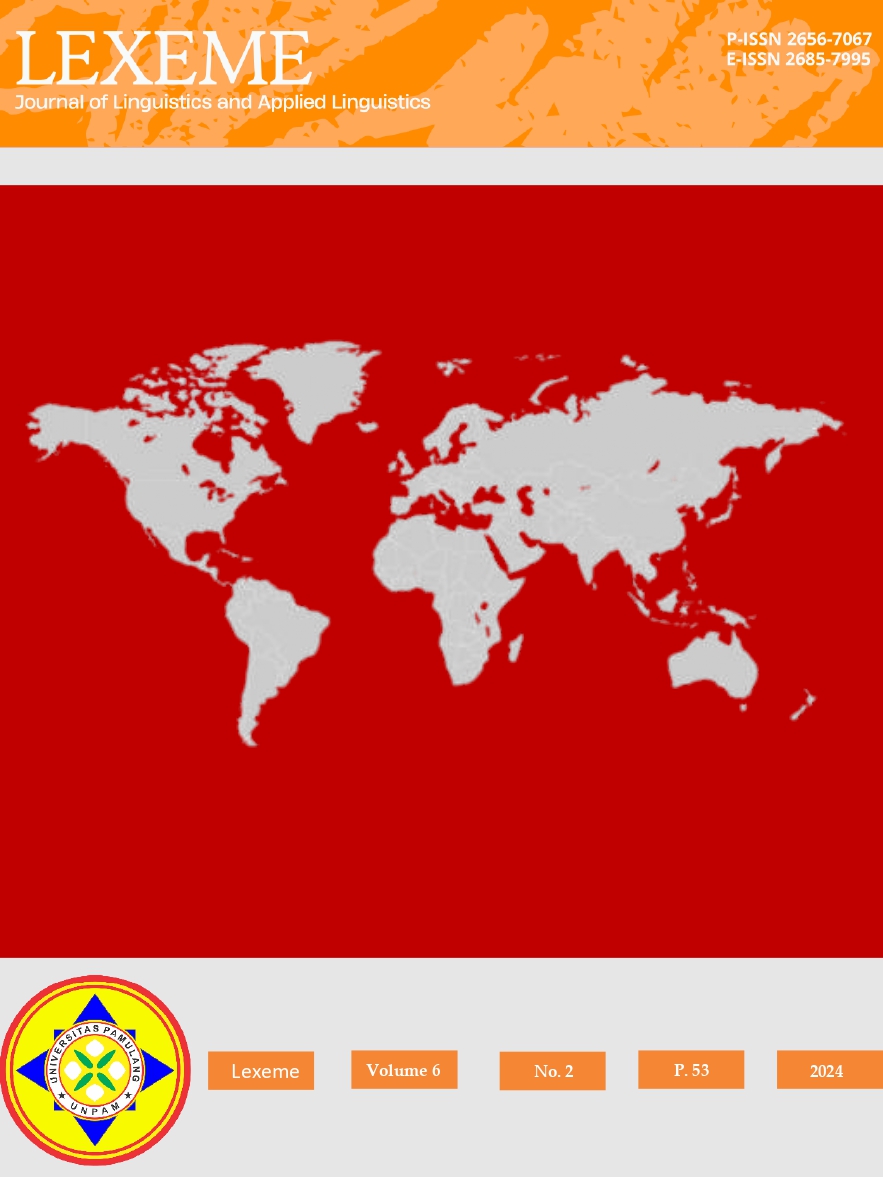Innovative Approaches: Integrating Technology into English Language Teaching and Curriculum Design
DOI:
https://doi.org/10.32493/ljlal.v6i1.41542Keywords:
curriculum, lesson plan, technologyAbstract
The motivation behind choosing this topic stems from the increasing importance of technology in education, particularly in teaching English as a foreign language. The researcher aims to explore the various instructional technology tools and resources used by English teachers. The objective of this research is to identify and understand the different types of technology employed in English language teaching and their effectiveness. This qualitative study focuses on two main concepts: the types of instructional technology tools and resources available, and their application in English language teaching. The subjects of the study are two English teachers from SMA Negeri 4 Bandar Lampung. Data was collected through semi-structured interviews, which allowed for in-depth insights into the teachers' experiences and practices. The data collection involved recording and transcribing the interviews, followed by a thematic analysis. This method helped in identifying recurring themes and patterns in the data, which were then systematically organized and analyzed. The findings reveal that English teachers use a variety of technological tools such as projectors, laptops, sound systems, digital textbooks, and online platforms like YouTube and Instagram. These tools not only enhance teaching effectiveness but also increase student engagement and learning outcomes.
References
Alakrash, H. M., & Abdul Razak, N. (2021). Technology-Based Language Learning: Investigation of Digital Technology and Digital Literacy. Sustainability, 13(21), 12304. https://doi.org/10.3390/su132112304
Ammade, S., Mahmud, M., Jabu, B., & Tahmir, S. (2020). TPACK Model Based Instruction in Teaching Writing: An Analysis on TPACK Literacy. International Journal of Language Education, 129–140. https://doi.org/10.26858/ijole.v4i2.12441
Braun, V., & Clarke, V. (2006). Using thematic analysis in psychology. Qualitative Research in Psychology, 3(2), 77–101. https://doi.org/10.1191/1478088706qp063oa
Braun, V., Clarker, V., & Rance, N. (2014). How to use thematic analysis with interview data. In A. Vossler & N. Moller (Eds.), The Counselling & Psychotherapy Research Handbook, (pp. 183–197). Sage.
Cahyono, B. Y., Kurnianti, O. D., & Mutiaraningrum, I. (2016). Indonesian EFL Teachers’ Application of TPACK in in-Service Education Teaching Practices. International Journal of English Language Teaching, 4(5), 16–30. https://eajournals.org/ijelt/vol-4-issue-5-may-2016/indonesian-efl-teachers-application-tpack-service-education-teaching-practices/
Carless, D. (2022). From teacher transmission of information to student feedback literacy: Activating the learner role in feedback processes. Active Learning in Higher Education, 23(2), 143–153. https://doi.org/10.1177/1469787420945845
Carstens, K. J., Mallon, J. M., Bataineh, M., & Al-Bataineh, A. (2021). Effects of technology on student learning. The Turkish Online Journal of Educational Technology, 20(1), 105–113. https://eric.ed.gov/?id=EJ1290791
Erikson Tarigan, K., & Liana, L. (2018). Improving Students’ Writing Descriptive Text Through Digital Storytelling Technique. Budapest International Research and Critics Institute (BIRCI-Journal) : Humanities and Social Sciences, 1(3), 345–351. https://doi.org/10.33258/birci.v1i3.58
Eshet, Y., & Eshet, Y. (2004). Digital Literacy: A Conceptual Framework for Survival Skills in the Digital era. Journal of Educational Multimedia and Hypermedia, 13(1), 93–106. https://www.learntechlib.org/primary/p/4793/.
Hastomo, T., Mandasari, B., & Widiati, U. (2024). Scrutinizing Indonesian pre-service teachers’ technological knowledge in utilizing AI-powered tools. Journal of Education and Learning (EduLearn), 18(4), 1572–1581. https://doi.org/10.11591/edulearn.v18i4.21644
Hastomo, T., & Septiyana, L. (2022). The Investigation of Students’ Engagement in Online Class During Pandemic Covid-19. Jurnal Penelitian Ilmu Pendidikan, 15(2). https://doi.org/10.21831/JPIPFIP.V15I2.49512
Istiara, F., & Hastomo, T. (2023). Exploring lecturers and administrative staffs’ strategies to hone EFL students’ digital literacy. JOALL (Journal of Applied Linguistics and Literature), 8(1), 151–172. https://doi.org/10.33369/JOALL.V8I1.25568
Kimm, C. H., Kim, J., Baek, E. O., & Chen, P. (2020). Pre-service teachers’ confidence in their ISTE technology-competency. Journal of Digital Learning in Teacher Education, 36(2), 96–110. https://doi.org/10.1080/21532974.2020.1716896
Nedungadi, P. P., Menon, R., Gutjahr, G., Erickson, L., & Raman, R. (2018). Towards an inclusive digital literacy framework for digital India. Education and Training, 60(6), 516–528. https://doi.org/10.1108/ET-03-2018-0061/FULL/XML
Niess, M. L. (2011). Investigating TPACK: Knowledge growth in teaching with technology. Journal of Educational Computing Research, 44(3), 299–317. https://doi.org/10.2190/EC.44.3.C
Novokreshchennykh, I., Byachkova, V., & Firstova, M. (2022). The Experience of Using Digital Trends and Smart Technologies in Literary Studies and Teaching of World Literature. Lecture Notes in Networks and Systems, 342 LNNS, 555–559. https://doi.org/10.1007/978-3-030-89477-1_53/COVER
Nugroho, A., & Mutiaraningrum, I. (2020). EFL teachers’ beliefs and practices about digital learning of English. EduLite: Journal of English Education, Literature and Culture, 5(2), 304–321. https://doi.org/10.30659/E.5.2.304-321
Oktarin, I. B., & Hastomo, T. (2024). Utilizing Critical Discourse Analysis on Developing Students’ Digital Literacy Skills: An Action Research. Premise: Journal of English Education and Applied Linguistics, 13(1), 90–105. https://doi.org/10.24127/PJ.V13I1.8758
Raygan, A., & Moradkhani, S. (2022). Factors influencing technology integration in an EFL context: investigating EFL teachers’ attitudes, TPACK level, and educational climate. Computer Assisted Language Learning, 35(8), 1789–1810. https://doi.org/10.1080/09588221.2020.1839106
Shah, R. K., & Barkas, L. A. (2018). Analysing the impact of e-learning technology on students’ engagement, attendance and performance. Research in Learning Technology, 26. https://doi.org/10.25304/RLT.V26.2070
Sohn, K., & Kwon, O. (2020). Technology acceptance theories and factors influencing artificial Intelligence-based intelligent products. Telematics and Informatics, 47, 101324. https://doi.org/10.1016/J.TELE.2019.101324
Solano, L., Cabrera, P., Ulehlova, E., & Espinoza, V. (2017). Exploring the Use of Educational Technology in EFL Teaching: A Case Study of Primary Education in the South Region of Ecuador. Teaching English with Technology, 17(2), 77–86. http://www.tewtjournal.org
Syamdianita, & Cahyono, B. Y. (2021). The EFL pre-service teachers’ experiences and challenges in designing teaching materials using TPACK framework. Studies in English Language and Education, 8(2), 561–577. https://doi.org/10.24815/SIELE.V8I2.19202
Downloads
Published
How to Cite
Issue
Section
License
Copyright (c) 2024 Martina Napida, Muhammad Farhan, Tommy Hastomo

This work is licensed under a Creative Commons Attribution-ShareAlike 4.0 International License.







